Opinion
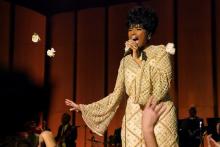
Respect is a must-see work, moving in its revelation of a superstar whose glow many of us have seen, the shadows surrounding them more hidden from view. Ms. Franklin was not just an incredible singer but also a civil rights activist like her father.
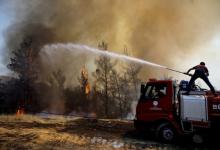
This week, the United Nations Intergovernmental Panel on Climate Change (IPCC) released a report on the state of the climate crisis. It is a report that frames, in the cautious language of science, the dire state of the world. This panel of experts from around the world found that warming of 1.5 to 2 degrees Celsius in the next century is certain unless there are extreme and immediate cuts in greenhouse gases. This level of warming would spread and intensify the kinds of extreme weather — hurricanes, wildfires, floods, and heat waves — we have seen unfold for over a decade. This report shows us the reality that our actions will not be enough to prevent catastrophic climate change. Immediate action on climate can prevent the worst effects of climate change — but catastrophe has already happened. Catastrophes are happening all around us.
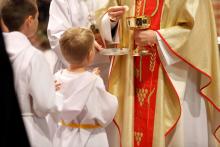
My first memory of receiving Christ is forever entangled with a social faux pas that caused me stress and pain.

Recently, the Centers for Disease Control and Prevention and other world organizations announced that over 1.5 million children had already been orphaned because of COVID-19, with more losses likely to come. Those precious souls are in desperate need of support, but not the kind Christians typically give. Around the world, devastation is caused by the institutionalization of children in residential schools and orphanages. Sadly, these institutions across the globe are often financially supported by American churches and charitable Christians who are unaware of their limitations and risks.
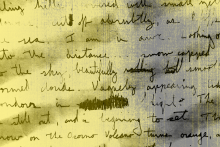
The Federal Bureau of Prisons is piloting a program to replace physical mail to prisoners with scanned copies, a program I believe is extremely unjust and has urgent implications for the practice of our faith, both for Christians who are incarcerated and Christians on the outside.

This is for you: for all of us who have watched as our bodies and our minds and our very being were commodified by the people in power, and even as we gained influence and strength, we knew our value hinged only upon what we might do, how we might produce, all the while knowing that a physical or mental collapse could hasten our own destruction. So we keep going.

The absurd hope found in Zillow-ing during the pandemic.

Talking about reparations in church inevitably brings up theological and economic questions. Sometimes these questions are asked in good faith. Other times, these questions are based on myths that need to be deconstructed.
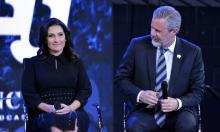
While the show's gossipy tone offers an entertaining portrait of the affection Falwell and his wife had for, shall we say, the things of this world, listeners may find themselves wanting more. I know I did.
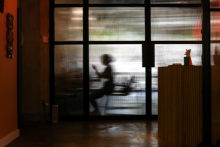
My brief attempt at recuperation from major surgery was not rest. Capitalism has taught us that rest is a cyclical but most importantly temporary state and that by optimizing our habits and schedules and bodies, we can actually require less of it. Abysmal leave policies in the United States have ingrained in us a quick-fix approach to medical crises, leaving those with chronic conditions and those who care for them behind.

Even in the midst of our lands groaning for their future restoration (Romans 8:22), the body of Christ dismantles the colonial systems that have privatized God’s creation. For in Christ, land and resources are not meant to be segregated but rather shared through hospitality for the flourishing of local communities, especially for the vulnerable and oppressed among us (1 John 3:17-18). In this way, Christ’s body is a new ecology between all lands, nations, and peoples through a common love for each other.

Home Video is not a Christian album, but I didn’t really want it to be. There are songs for VBS, but these are songs about VBS. We need both.
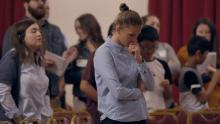
The spiritual and psychological harm of conversion therapy is indeed intense. Rodgers gives an insider’s account in her new memoir Outlove and Pray Away, which premieres on August 3. Her survival story will appeal to readers and viewers whether they are LGBTQ and Christian, one or the other, or none of the above.
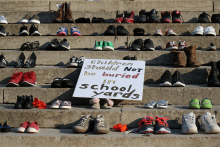
Indigenous people knew the graves were there. Canada’s investigation, the Truth and Reconciliation Commission, which ended in 2015, contained a large section on unmarked graves. Survivors in Canada and the United States talked about these mass graves, but people didn’t hear them, so when the graves were uncovered, people were shaken. But that level of emotional intensity is hard to maintain. The emotions the news elicits are painful — so after the speeches and the promises, equilibrium is restored and things go back to normal. To business as usual.

My doctor's reaction to my disorder was rare. When he noticed that my prescriptions were running out faster than they should, he did not shame, blame, or accuse me of any grave moral failing. With kindness and compassion, he noted that I had developed an addiction and immediately assured me that I had done nothing wrong.

Theology isn’t the only place we overlook the feminine.

I think we usually ask these questions in a penitential key: “Where was God during this tragedy?” Being a human is difficult — so difficult that it is not only hard to imagine someone created us, but also that there exists anything outside of the mess we’ve created. We often collapse in on each other — whether by accident or on purpose.
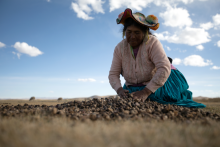
Modernity claims humans are the only citizens — the owners and rulers of nature – thus fracturing our relationship with nature and with one another as we compete to amass or inherit resources. This voracious system is built to protect those with wealth and their resources rather than to protect human and natural life. The deadly consequences of this paradigm are evident: Last month, the United States experienced the hottest June on record since we began keeping track 127 years ago.

As we continue to seek the truth behind the assassination, the real fear among Haitians is over what might happen next. Especially because we have seen how Western powers repeatedly use periods of Haiti’s “destabilization” as a pretext for exploiting the nation’s resources and people.

If we want to understand this tragedy, we must see more clearly the failure of these physical and social structures that we have built and continue to build. For too long, the Christian imagination has divorced our identities and social worlds from geography, as if we exist in the abstract, apart from the land and the built environment we inhabit. But what if who we are — and especially who we are together — is completely dependent on the everyday spaces we inhabit, like high-rise condos and retirement communities?